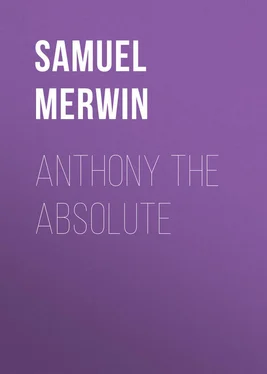Samuel Merwin - Anthony The Absolute
Здесь есть возможность читать онлайн «Samuel Merwin - Anthony The Absolute» — ознакомительный отрывок электронной книги совершенно бесплатно, а после прочтения отрывка купить полную версию. В некоторых случаях можно слушать аудио, скачать через торрент в формате fb2 и присутствует краткое содержание. ISBN: , Жанр: foreign_prose, на английском языке. Описание произведения, (предисловие) а так же отзывы посетителей доступны на портале библиотеки ЛибКат.
- Название:Anthony The Absolute
- Автор:
- Жанр:
- Год:неизвестен
- ISBN:http://www.gutenberg.org/ebooks/52507
- Рейтинг книги:5 / 5. Голосов: 1
-
Избранное:Добавить в избранное
- Отзывы:
-
Ваша оценка:
- 100
- 1
- 2
- 3
- 4
- 5
Anthony The Absolute: краткое содержание, описание и аннотация
Предлагаем к чтению аннотацию, описание, краткое содержание или предисловие (зависит от того, что написал сам автор книги «Anthony The Absolute»). Если вы не нашли необходимую информацию о книге — напишите в комментариях, мы постараемся отыскать её.
Anthony The Absolute — читать онлайн ознакомительный отрывок
Ниже представлен текст книги, разбитый по страницам. Система сохранения места последней прочитанной страницы, позволяет с удобством читать онлайн бесплатно книгу «Anthony The Absolute», без необходимости каждый раз заново искать на чём Вы остановились. Поставьте закладку, и сможете в любой момент перейти на страницу, на которой закончили чтение.
Интервал:
Закладка:
The manager has just been up to see me. He says that the waiter is all right now, excepting a slight nausea. And he suggests that Crocker leave the hotel as soon as convenient. Poor fellow, I shall have to carry this word to him. I found, on pinning the manager down, that by the phrase “as soon as convenient” he means as early to-morrow as possible. But I shall not wake Crocker up; he shall have his sleep before they turn him out on the Bund.
Well, I must get ready now for my night watch. It is the first time I have ever been responsible for a drunken man.
To-morrow I leave over the Tokaido Railway for the Straits of Tsushima, Korea, Manchuria, and the barbaric old capital of the newest republic on earth. It has been a curious experience throughout, this with Crocker. But it will soon be over now. And I do not regret it. I may never again be drawn so deeply into the rough current of actual life. My way lies far from this.
On the Railway, Coasting the Island Sea – March 31st
CROCKER’S story came out, after all. This morning, in his room. It is rather difficult writing here on the train, with only a suit-case for a table; but I feel that I must set down the last of this strange story, now that I have given so much of my time and thought to the man; and it must be written before any new experiences may arise to claim my attention and perhaps erase some salient detail of the narrative. Then, who knows? This may not be the last. I may find myself involved in it again. Sir Robert observed yesterday: “The China Coast is even smaller than the well-known world. Even if I should miss you at Peking, we shall meet again.” He is doubtless right. We shall meet again. And Crocker and I, too, shall meet again, I think. When and how, I can only wonder.
I slept badly last night, on his sofa. Early this morning I returned to my own room, dressed, ordered up a light breakfast, and then spent two hours in packing. It was nearer eleven than ten when I tapped on the door.
“Come in!” he called.
He had pulled an extra pillow in behind his head, and was sitting up in bed. He was whiter than I had before seen him. And the hand that he extended to me shook so that he could hardly hold it up. It was cold to the touch.
For a few moments after I had sent a boy for his coffee, we talked about next to nothing – the time, the weather, my departure. But his hollow eyes were searching me.
“Who put me here?” he asked, finally.
I told him.
“Any trouble?”
I hesitated.
“Tell me. Don’t play with me. Did I break out?”
There was nothing to do but tell him the whole story; which I did. He listened in complete silence, sipping the coffee (for which he seemed to feel some repugnance).
“Hurt the fellow?” he asked, when I had done.
“No. He is reported all right this morning.”
His chin dropped on his deep chest. He seemed to be mediating, in a crestfallen sort of way; but I observed that his eyes wandered aimlessly about the room. Finally he said:
“Suppose I had killed him.”
“You did n’t,” I replied shortly.
He covered his face with his shaking hands.
“It’s the murder in my heart,” he muttered.
I could only look at him.
After a little he dropped his hands, leaned back on the pillow, and gazed at me.
“You’re blaming me,” he said.
I shook my head.
“You are. But not so much as you will. Do you know what I’m doing out here? Do you suppose I left my business to come halfway around the world on a pleasure trip – at my age? Chuck everything worth while, just when I’m at the top of my stride? No, you don’t know; but I’m going to tell you.”
I put up my hand, but he plunged gloomily on: “My wife eloped with a man. A man I knew. They came out here. I’ve come to find them. I’m going to kill him and her. With a knife.”
“You must not do that,” said I. I recall now that the thought came to me to deal with him as if he were a lunatic, and humor him. So I said, “You must not do that.”
“It is the only thing to do,” said he, rather dogmatically. “How can I face my friends again if I fail? A man who doesn’t even try to protect his home!”
“It would be murder.”
He shook his head. “No honest jury would hang me for that. It is the unwritten law.” Then, as if conscious of the weakness of his argument, he added: “Besides, what difference does it make? Those two have committed worse than murder against me. It does n’t matter a particle now what becomes of me. I loved my wife. I gave her everything that money could buy. I bought her an automobile for her own only last year. I took her to Europe. And when I married her she had never had anything or been anywhere. I wanted her to be the mistress of my home, and she insisted on sacrificing all that – and me – to her music. So I got her the best teachers in New York and Paris. Even left her in Paris to study. That’s where she met him. She insisted on going into opera. I forbade that – naturally. I wanted children – she refused. Tell me – is that asking too much?”
He had been talking in a monotonous tone; but now his voice began rising, and his face was twitching nervously.
“Is it?” he went on. “Is it asking too much for a husband to have sons to bear his name and inherit his property? When I saw what was going on, she told me to divorce her. I said, ‘By God, that’s one thing I won’t do for you! I’ve some sense of honor, if you haven’t! You’re mine, and yuu stay mine!’ Then she ran away with that crook. But she can’t have him, I tell you! She can’t have him!”
I suggested that he lower his voice. He gave me a curious, wild glance, and fell silent.
It occurred to me that, knowing all this, I had no right to go away – that I must stay and prevent this terrible thing from taking place. I said as much to him.
“No,” he replied, with some vehemence; “there’s nothing in that. You could n’t prevent anything. The best thing you can do is to run along. I don’t even know where they are; but I’ll find them. You can’t hide long on the China Coast – not from a man that’s really looking.”
I thought this over for quite a little time. It was true enough that I could not prevent his giving me the slip. I could not lock him up or detain him in any forcible way. It seemed to me that I must do something; but as the moments passed it grew increasingly difficult to imagine what it could be.
It was all very disturbing. I helped him get up. Then, as he seemed fairly well able to dress himself, I went out and walked for a while on the Bund. When I returned I found him stretched out on my sofa, smoking.
“Come on in,” he said in a strong, sober voice. What an extraordinary fund of vitality the man has to draw on! “I want to talk to you.”
As I sank into a chair beside him, I felt once more that he was the stronger of us, I the weaker, even after all we had been through.
He knocked the ash off his cigar. It missed the ash-tray and fell, part of it, on the leg of my trousers. “I beg your pardon, old man,” he said, and carefully brushed it off. Then he settled back against the wall and stared up through his smoke at the pattern on the ceiling.
“My hand is n’t quite steady yet,” he added calmly.
Then he went on: “I should n’t have told this to you, Eckhart. It is n’t the sort of thing a man can tell. But, as it happens, you know why I did it. I’ve been stewed to the brim for two days. I’m through with that now, though. Until a certain job is done, I touch nothing stronger than wine. Here’s my hand on it.”
I had to clear my throat. I managed to say huskily: “I can’t take your hand on that, Crocker.”
He shrugged his shoulders. “Very well,” he said. “If you prefer it that way. It goes, however. I drink no more now. That is one thing I really have you to thank for, Eckhart. Until you spoke out, back there on the ship, I did n’t realize how much I was drinking. What you told me this morning has clinched the business. I’m through. And you will find that I am a man of my word.”
Читать дальшеИнтервал:
Закладка:
Похожие книги на «Anthony The Absolute»
Представляем Вашему вниманию похожие книги на «Anthony The Absolute» списком для выбора. Мы отобрали схожую по названию и смыслу литературу в надежде предоставить читателям больше вариантов отыскать новые, интересные, ещё непрочитанные произведения.
Обсуждение, отзывы о книге «Anthony The Absolute» и просто собственные мнения читателей. Оставьте ваши комментарии, напишите, что Вы думаете о произведении, его смысле или главных героях. Укажите что конкретно понравилось, а что нет, и почему Вы так считаете.












